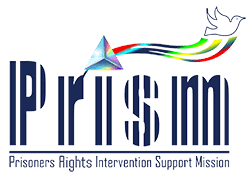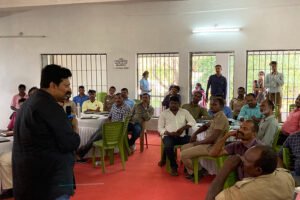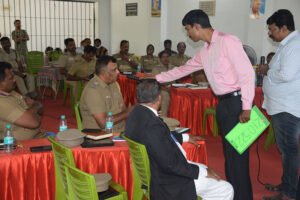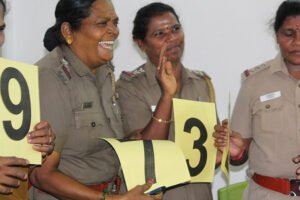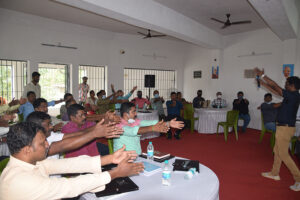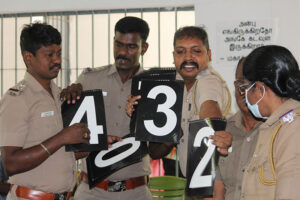Have Any Query?
contact nowBook an Appointment
Error: Contact form not found.
PARAVAI
PARAVAI is designed to complement the psychological intervention program, PATTAM, by addressing the needs of young first-time petty offenders prior to remand and after release from prison. Since the PATTAM program primarily caters to the needs of the young first-time petty offenders during their period of remand it was felt necessary to have a more holistic intervention program under the leadership of the Greater Chennai Police. Consequently, PARVAI, a one of a kind program was conceived jointly by the Commissioner, Greater Chennai Police and PRISM.
The PARAVAI program aims to formulate and establish systems and procedures for effective reformation, rehabilitation and reintegration into society of young, first-time, petty offenders to reduce recidivism. It was born out of the need to provide necessary support to these youngsters to prevent them from pursuing a life of crime. PARAVAI takes a reformative rather than punitive approach towards these youngsters by providing them with both the emotional and physical tools they need to reintegrate as productive citizens
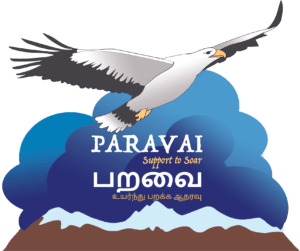
PARAVAI stands for Personality Attitude Reformation Assistance Venture Affirming Identity. The logo was carefully chosen depicting an eagle flying over the mountains and clouds as backdrop. The eagle is the only bird which flies higher during a storm by using the wind to its advantage. This visualization is to encourage young first-time petty offenders to face the life with the support of this project.
The PARAVAI project was inaugurated on 28th March 2022 by Hon’ble Justice Mr P.N.Prakash, Judge, Madras High Court, at the office of Commissioner, Greater Chennai Police Chennai.
STAKEHOLDERS
In order to aid, assist, supervise and implement the PARAVAI program, the Greater Chennai Police has collaborated with other organizations and departments. A meeting was held with the stakeholder departments to explain and make them understand the role of each stakeholder’s department. Nodal officers were also appointed for field level co-ordination.
-
Greater Chennai Police
Nodal Police Officers and Jurisdictional Police Stations for data collection, oversight, support services, needs assessment, reporting
-
Department of Employment and Training
Counselling, Career Guidance, Skill Training, Job Placement
-
Department of Social Defence
Oversight of Family Visit, Counselling, Career Guidance, Needs Assessment, Vocational Training, Referral, Data Collection, Review & Reporting
-
Department of Prisons & Correctional Services
Conduct PATTAM program, Follow up by POs, Skill training / Placement, Welfare schemes by TNDPAS (Tamil Nadu Prisoners Discharge Prisoners Aid Society)
-
Institute of Mental Health
Counselling, Psychological intervention, Needs assessment
-
Tamil Nadu State Legal Services Authority
Free legal aid and services, Referral, Data collection, Review, Reporting through the offices of the District Legal Services Authority
TRAINING FOR THE POLICE
To make PARAVAI more effective, it was necessary to orient various levels of police officers on the PARAVAI reformation model. The Nodal Police Officers were trained first, in April 2022, as they are the coordinators from the field. From May to January 2023, orientation programs were held for Inspectors, Writers, Probation Officers, Senior Police officers and Judicial officers.
ORIENTATION OUTLINE
- The Value of Sacrifice and Effort
- PATTAM Program model, PATTAM Beneficiaries success stories
- PARAVAI Reformation Program Framework
- What is Reformative approach?
- Reformative approach models
- Best practices on reformation
- Action Plan for Implementation of the PARAVAI Program
PARAVAI SUCCESS STORY
Kannan, an 18-year old, was remanded on 5th May 22 at the R5 police station in Virugambakkam. A resident of Rajaji colony, Saligramam, Chennai, Kannan’s father works as a cab driver and his mother works as a house keeper. His younger sister studies in the 6th standard in the Corporation School, Saligramam. Officer Anusuya, a Nodal Police Officer (NPO) of the PARAVAI project, was deputed to support and follow up with this boy according to his needs and help him reintegrate into society.
When Kannan was first remanded, he was dejected and did not respond to Officer Anasuya. During the period of his remand in the Sub jail at Saidapet, Kannan underwent the PATTAM program in which experts teach life skills. He also did a skill assessment, facilitated by the State Career Guidance Centre, which helped him to realize his interest in the field of Electrical and Electronics. When professionals from the Institute of Mental Health (IMH) visited the Sub Jail, Saidapet, his substance dependency was assessed and he was referred to the IMH for treatment. His parents did not take any measures to get him out in bail as they could not accept their sons conduct. Officer Anasuya approached the District Legal Services Authority (DLSA) for free legal aid and on 27th May 22 the boy got the bail order and was released.
After release, the Officer Anasuya took the boy to his home, but his parents were not willing to take him in. She then persuaded his parents to take care of him for two days before admitting him in IMH for deaddiction treatment. On 31st May 22, Kannan underwent psychological and clinical tests and was admitted in IMH for in-patient de-addiction treatment for 21 days. The test results showed that the boy’s liver had inflammation and so he needed further treatment.
Office Anasuya visited Kannan regularly and followed his progress with the doctors. After 24 days of de-addiction in-patient treatment, Kannan was discharged on 22nd Jun 22 with some medicines prescribed to him. Again, the parents were not willing to take him back home and Officer Anasuya had to convince them that the boy would be admitted in an educational institute.
During the regular follow up, she also found out that the boy’s peer group was a big deterrent to Kannan’s progress and he also confessed that he still needed help for his substance dependency. Officer Anasuya took him to the TTK de-addiction Centre for further treatment where he was treated for 15 days and discharged on 1st Aug 22.
After much effort, Kannan was admitted to the Industrial Training Institute, Katpadi on 17th Aug 22 to do his ITI technical training as an Electrician. Now he and his family are happy to see him rehabilitated, reformed and reintegrated into society.
